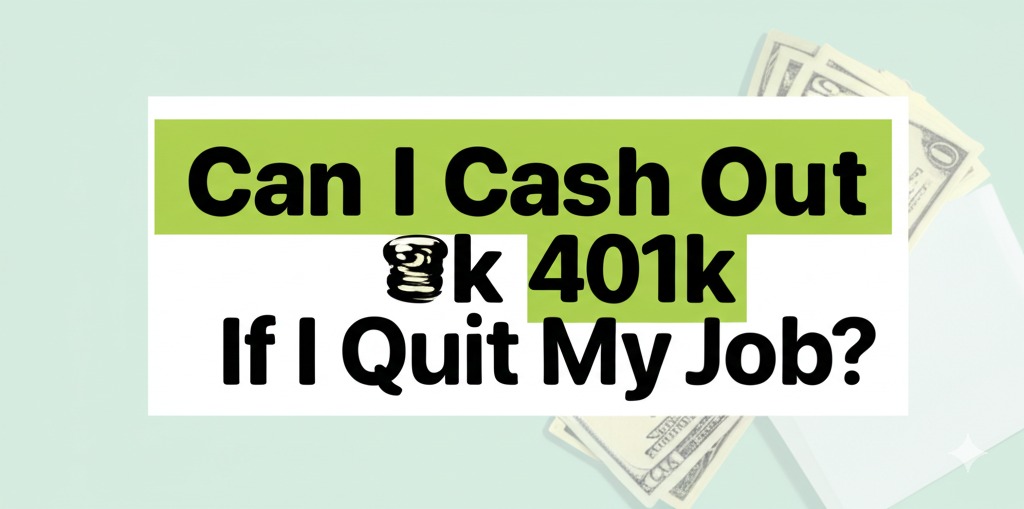
When you leave your job, whether it’s to pursue a new opportunity, retire early, or for personal reasons, one of the questions that may come up is what happens to your 401k. Specifically, “Can I cash out my 401k if I quit my job?” This is a question many employees have, and while the answer is generally yes, the situation can get a bit complicated depending on your individual circumstances. In this article, we’ll explore the ins and outs of cashing out your 401k after quitting your job, the potential consequences, and alternative options to consider.
What Happens to Your 401k When You Quit Your Job?
After you leave a job, your 401k doesn’t automatically vanish. You have several options for what to do with your retirement savings, including leaving the account where it is, transferring it to a new employer’s plan, or cashing it out. But before you take any action, it’s important to fully understand the pros and cons of cashing out.
The Basics of Cashing Out Your 401k
Cashing out your 401k means that you withdraw the balance of the account and receive it in the form of a lump sum payment. This might sound tempting, especially if you’re facing an immediate financial need. However, cashing out your 401k isn’t always the best choice.
Can You Cash Out Your 401k After Quitting?
Yes, you can cash out your 401k after quitting your job. However, this decision should not be made lightly. When you cash out, the funds from your 401k are paid directly to you. You may think of it as accessing your hard-earned money, but it’s important to be aware of the potential downsides.
Penalties and Taxes When Cashing Out a 401k
One of the biggest drawbacks of cashing out your 401k is the penalty. If you’re under 59½, the IRS imposes an early withdrawal penalty of 10%. On top of that, you’ll also owe income taxes on the full amount you withdraw. Depending on your tax bracket, this can be a significant portion of your 401k balance. In fact, it’s common to lose up to 30% or more of the total amount due to penalties and taxes.
- Early Withdrawal Penalty: 10%
- Federal Taxes: Varies depending on your tax bracket
- State Taxes: Can also apply depending on where you live
Exceptions to the Penalty
There are a few exceptions where the early withdrawal penalty may be waived. These include:
- Becoming permanently disabled
- Using the funds for medical expenses exceeding 7.5% of your adjusted gross income
- Rolling the funds over into another retirement account
However, even in these cases, you may still owe federal and state income taxes.
What Are the Alternatives to Cashing Out Your 401k?
While cashing out your 401k may seem like an easy way to access funds, there are other, more financially advantageous options available. Let’s explore some of them.
Leaving the Money in Your Old 401k
In many cases, you can leave your money in your previous employer’s 401k plan, especially if your balance is over $5,000. This option lets you avoid the early withdrawal penalty and continue to benefit from tax-deferred growth. However, this option may not be the most convenient if your former employer charges high fees or if you’re no longer able to monitor the account.
Rolling Over Your 401k into an IRA
A rollover is one of the best alternatives to cashing out. By rolling over your 401k into an IRA (Individual Retirement Account), you can continue to grow your money tax-deferred. In addition, an IRA often offers more investment options than a typical 401k plan. There are no penalties or taxes as long as the rollover is done correctly, and the funds stay within a retirement account.
Transferring Your 401k to a New Employer’s Plan
If you’ve found a new job with a 401k plan, you may be able to transfer your old 401k into your new employer’s plan. This option can simplify your finances by consolidating your retirement accounts into one place. It also allows you to continue growing your savings in a tax-advantaged account.
What Happens if You Don’t Take Action?
If you don’t decide what to do with your 401k after quitting your job, it will remain in your previous employer’s plan until you take action. In some cases, your former employer may charge maintenance fees, which can eat into your balance. If your balance falls below a certain amount (typically $5,000), your employer may cash out your 401k and send you a check, potentially subject to penalties and taxes.
Conclusion: What Should You Do with Your 401k After Quitting?
If you’re asking, “Can I cash out my 401k if I quit my job?” the answer is yes, but it comes with significant downsides in the form of taxes and penalties. The decision to cash out should be carefully considered, especially if you’re under the age of 59½.
Instead of cashing out, consider alternatives like rolling your 401k into an IRA or transferring it to a new employer’s 401k plan. These options allow your retirement savings to continue growing without incurring unnecessary penalties and taxes.
If you’re unsure of the best path forward, consider speaking with a financial advisor to ensure you make the most informed decision for your future.

Andre Cuevas provides career insights, job search strategies, and professional advice to help individuals navigate the job market and achieve their career goals.




